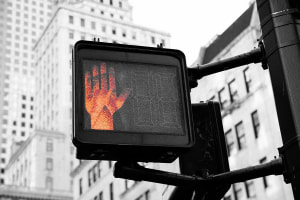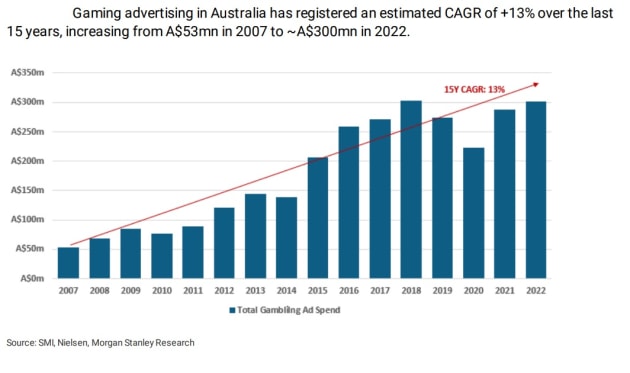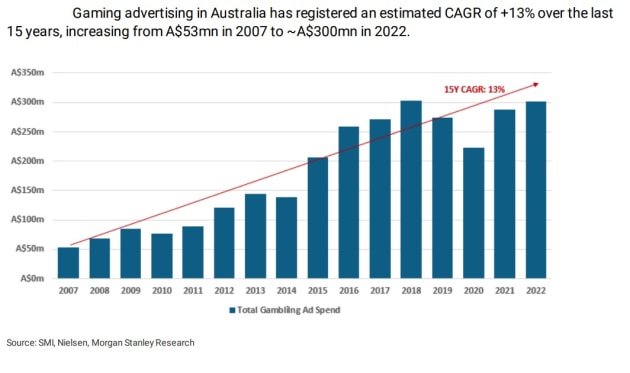
Credit: Kai Pilger via Unsplash
Television, especially sports broadcasting, would be hit hard and other media platforms would also suffer under a ban on gambling advertising, widely seen by viewers as pervasive and unwanted stream of noise.
A parliamentary inquiry recommendation to ban gambling advertising over three years set off strong protests from sectors of the media and from gambling platforms.
The Australian commercial radio industry says radio has been unfairly treated and Free TV says the inquiry is taking an “extreme approach“.
The online betting shops, represented by Responsible Wagering Australia, say blanket bans are ineffective to stop problem gamblers who would just turn to illegal offshore markets.
However, the parliamentary committee chair, Labor MP Peta Murphy, says the torrent of advertising is inescapable.
“It is manipulating an impressionable and vulnerable audience to gamble online,” she says.
“Australia’s largest professional sporting codes and broadcast media were largely in lockstep with their advertising and sponsorship partners in the gambling industry during this inquiry to oppose further restrictions.”
In the advertising industry, linear television is already under pressure, seeing substantial dips in advertising spend following a post pandemic lockdown bump.
Both Seven West Media and Nine Entertainment have identified a weaker market this year.
And the disappearance of gambling advertising would have a meaningful impact on both the ASX-listed media groups.
Analysts estimate gambling ads make up around 6%, or $180 million, of TV ad revenues of $3.2 billion.
Advertising on gambling in Australia has grown by around 13% compound a year over the last 15 years, going to $300 million in 2022 from $53 million in 2007, according to analysis by investment bank Morgan Stanley.
An estimated 50%-60% of that went to free-to-air television, 20% to digital, 10% to radio, 5% to outdoor and the rest to print and cinema.
“Advertising related to sports betting/wagering has been a huge growth category for Australian media companies over the last decade,” analysts at Morgan Stanley wrote in a note to clients:
“As such, any reduction in ad spending is likely to have negative consequences for TV broadcasters.”
Media analyst Steve Allen, director of strategy and research at Pearman, says an immediate ban would wipe out about half TV’s profitability.
“Most mediums would be affected,” he says.
“Worse, this move would make many of the longer term Sports Telecast rights uneconomical.
“There would be a very big knock on effect for the major sporting organisations. I believe it would signal the peak of pricing of sports telecast rights.”
Morgan Stanley hasn’t changed its base case earnings estimates or valuations for Nine and Seven.
“What we know, having observed similar changes to advertising regulation in the past… is that it’s unlikely for the elimination of gambling ad spending to result in a 100% loss of those specific revenues,” the analysts say.
“The advertising slots surrounding and during top-tier sport and sport-related Broadcasting are premium slots that will be in demand by other types of advertisers.”
Whether or not that inventory can be sold at the same premium is the big question,
However, there are many in the advertising industry who take a stand against exploitation of the vulnerable.
Joel Trethowan, managing director at Independent media agency Alchemy One, says it’s crucial to take a step back from the industry’s concerns about revenue loss, and the characterisation of this measure as extreme, to understand the broader social responsibility of the media industry.
“Gambling ads have become pervasive in various media platforms, normalising and promoting an industry that profits from individuals’ vulnerability,” he says.
“The negative impact of gambling on individuals and families cannot be overlooked. Addiction, financial ruin, and psychological distress are just a few of the consequences faced by those affected.
“By implementing this proposed ban, the government would be sending a powerful message that media should not perpetuate an industry that thrives on exploiting the vulnerable.
“The proposed three-year phase-out is an incredibly fair proposition. It would be a sensible and welcome approach to finally making some moves towards regulating gambling advertising and the impact it has had on the people of Australia.
“Calling the new measures ‘extreme’ are almost laughable, given Australia’s online gambling ads are 20% higher than any other nation. What we have tolerated and enabled as an industry to date is extreme.
“It’s important to remember that this recommendation is just the first step towards implementation at a government level. The battle has just begun, and we can anticipate immense pressure from sporting codes and media platforms to stop this from happening. Now is the time for us to remain vocal and resist.
“We must continue to put pressure on our elected officials and advocate for the importance of this ban. Think back to how the industry tackled cigarette advertising – it’s done it before and it can do it again. People first, profit second.”
The growth of gambling advertising:

Have something to say on this? Share your views in the comments section below. Or if you have a news story or tip-off, drop us a line at [email protected]
Sign up to the AdNews newsletter, like us on Facebook or follow us on Twitter for breaking stories and campaigns throughout the day.
